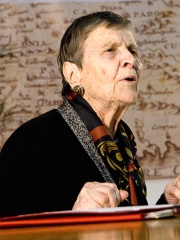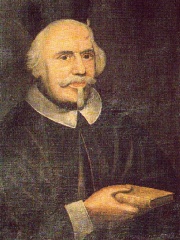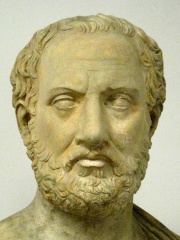
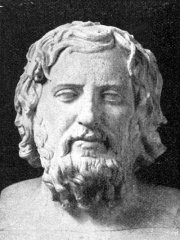

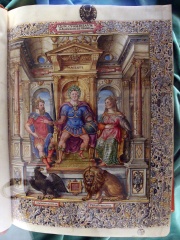


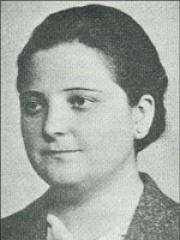
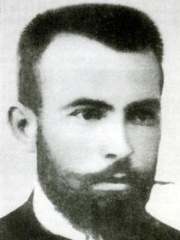
The Most Famous
HISTORIANS from Greece
This page contains a list of the greatest Greek Historians. The pantheon dataset contains 561 Historians, 14 of which were born in Greece. This makes Greece the birth place of the 9th most number of Historians behind Russia, and Poland.
Top 10
The following people are considered by Pantheon to be the top 10 most legendary Greek Historians of all time. This list of famous Greek Historians is sorted by HPI (Historical Popularity Index), a metric that aggregates information on a biography's online popularity. Visit the rankings page to view the entire list of Greek Historians.

1. Thucydides (460 BC - 397 BC)
With an HPI of 83.71, Thucydides is the most famous Greek Historian. His biography has been translated into 93 different languages on wikipedia.
Thucydides ( thew-SID-ih-deez; Ancient Greek: Θουκυδίδης, romanised: Thoukudídēs [tʰuːkydǐdɛːs]; c. 460 – c. 400 BC) was an Athenian historian and general. His History of the Peloponnesian War recounts the fifth-century BC war between Sparta and Athens until the year 411 BC. Thucydides has been dubbed the father of "scientific history" by those who accept his claims to have applied strict standards of impartiality and evidence-gathering and analysis of cause and effect, without reference to intervention by the gods, as outlined in his introduction to his work. Thucydides has been called the father of the school of political realism, which views the political behaviour of individuals and the subsequent outcomes of relations between states as ultimately mediated by, and constructed upon, fear and self-interest. His text is still studied at universities and military colleges worldwide. The Melian dialogue is regarded as a seminal text of international relations theory, while his version of Pericles's Funeral Oration is widely studied by political theorists, historians, and students of the classics. More generally, Thucydides developed an understanding of human nature to explain behaviour in such crises as plagues, massacres, and wars.

2. Xenophon (430 BC - 354 BC)
With an HPI of 82.05, Xenophon is the 2nd most famous Greek Historian. His biography has been translated into 90 different languages.
Xenophon of Athens (; Ancient Greek: Ξενοφῶν; c. 430 – 355/354 BC) was a Greek military leader, philosopher, and historian. At the age of 30, he was elected as one of the leaders of the retreating Greek mercenaries, the Ten Thousand, who had been part of Cyrus the Younger's attempt to seize control of the Achaemenid Empire. As the military historian Theodore Ayrault Dodge wrote, "the centuries since have devised nothing to surpass the genius of this warrior". For at least two millennia, it has been debated whether Xenophon was first and foremost a general, historian, or philosopher. For the majority of time in the past two millennia, Xenophon was recognised as a philosopher. Quintilian in The Orator's Education discusses the most prominent historians, orators and philosophers as examples of eloquence and recognises Xenophon's historical work, but ultimately places Xenophon next to Plato as a philosopher. Today, Xenophon is recognised as one of the greatest writers of antiquity. Xenophon's works span multiple genres and are written in plain Attic Greek, which is why they have often been used in translation exercises for contemporary students of the Ancient Greek language. In the Lives and Opinions of Eminent Philosophers, Diogenes Laërtius observed that Xenophon was known as the "Attic Muse" because of the sweetness of his diction. Despite being born an Athenian citizen, Xenophon came to be associated with Sparta, the traditional opponent of Athens. Much of what is known today about the Spartan society comes from Xenophon's royal biography of the Spartan king Agesilaus and the Constitution of the Lacedaemonians. The sub-satrap Mania is primarily known through Xenophon's writings. Xenophon's Anabasis recounts his adventures with the Ten Thousand while in the service of Cyrus the Younger, Cyrus's failed campaign to claim the Persian throne from Artaxerxes II of Persia, and the return of Greek mercenaries after Cyrus's death in the Battle of Cunaxa. Xenophon wrote Cyropaedia, outlining both military and political methods used by Cyrus the Great to conquer the Neo-Babylonian Empire in 539 BC. Anabasis and Cyropaedia inspired Alexander the Great and other Greeks to conquer Babylon and the Achaemenid Empire in 331 BC. The Hellenica continues directly from the final sentence of Thucydides' History of the Peloponnesian War covering the last seven years of the Peloponnesian War (431–404 BC) and the subsequent forty-two years (404–362 BC) ending with the Second Battle of Mantinea. Xenophon's writings on military strategies remain influential and are believed to be among the first to utilise and describe flanking manoeuvres and feints in military tactics.

3. Polybius (208 BC - 126 BC)
With an HPI of 77.83, Polybius is the 3rd most famous Greek Historian. His biography has been translated into 70 different languages.
Polybius (; Ancient Greek: Πολύβιος, Polýbios; c. 200 – c. 118 BC) was an ancient Greek historian of the middle Hellenistic period. He is noted for his Histories, a universal history documenting the rise of Rome in the Mediterranean in the third and second centuries BC. It covers the period 264–146, recording in detail events in Italy, Iberia, Greece, Macedonia, Syria, Egypt and Africa, and documents the Punic Wars and Macedonian Wars among many others. Polybius's Histories is important not only for being the only Hellenistic historical work to survive in any substantial form, but also for its analysis of constitutional change and the mixed constitution. Polybius's discussion of the separation of powers in government, of checks and balances to limit power, and his introduction of "the people", all influenced Montesquieu's The Spirit of the Laws, John Locke's Two Treatises of Government, and the framers of the United States Constitution. Polybius was a close friend and mentor to the Roman politician and general Scipio Aemilianus (also called Scipio Africanus the Younger), and had a lasting influence on his decision-making and life.

4. Quintus Curtius Rufus (41 - 53)
With an HPI of 72.96, Quintus Curtius Rufus is the 4th most famous Greek Historian. His biography has been translated into 50 different languages.
Quintus Curtius Rufus () was a Roman historian, likely active in the 1st century AD. He is known solely for his surviving work, Historiae Alexandri Magni ("Histories of Alexander the Great"), more fully titled Historiarum Alexandri Magni Macedonis Libri Qui Supersunt ("The Surviving Books of the Histories of Alexander the Great of Macedon"). Significant portions of the original work are missing. Aside from his name on the manuscripts, no biographical details about Curtius Rufus are definitively known. This lack of information has led some philologists to speculate that he may have had another, unidentified historical identity. Several theories have been proposed, though they are regarded with varying degrees of credibility. Nevertheless, the identity of Quintus Curtius Rufus as the author of the Histories is generally treated as distinct.

5. Callisthenes (360 BC - 327 BC)
With an HPI of 69.54, Callisthenes is the 5th most famous Greek Historian. His biography has been translated into 34 different languages.
Callisthenes of Olynthus (/kəˈlɪsθəˌniːz/; Greek: Καλλισθένης; c. 360 – c. 327 BCE) was a Greek historian in Macedon with connections to both Aristotle and Alexander the Great. He accompanied Alexander the Great during his Asiatic expedition and served as his historian and publicist. He later opposed Alexander’s adoption of Persian culture and was arrested after being implicated in a plot on the king's life; he died in prison. During his life, he authored several works on Greek history and a biography of Alexander the Great.

6. Theopompus (400 BC - 320 BC)
With an HPI of 69.44, Theopompus is the 6th most famous Greek Historian. His biography has been translated into 36 different languages.
Theopompus (Ancient Greek: Θεόπομπος, Theópompos; c. 380 BC – c. 315 BC) was an ancient Greek historian and rhetorician who was a student of Isocrates.

7. Michael Glykas (1125 - 1204)
With an HPI of 64.91, Michael Glykas is the 7th most famous Greek Historian. His biography has been translated into 21 different languages.
Michael Glykas or Glycas (Greek: Μιχαὴλ Γλυκᾶς) was a 12th-century Byzantine historian, theologian, mathematician, astronomer and poet. He was probably from Corfu and lived in Constantinople. He was a critic of Manuel I Komnenos, and was imprisoned and blinded due to his participation in a conspiracy against the emperor. He is also identified by modern scholarship with Michael Sikidites (Μιχαὴλ Σικιδίτης), who was condemned as a heresiarch in 1200.

8. Afet İnan (1908 - 1985)
With an HPI of 62.44, Afet İnan is the 8th most famous Greek Historian. Her biography has been translated into 23 different languages.
Ayşe Afet İnan (30 October 1908 – 8 June 1985) was a Turkish historian and sociologist. She was one of the eight adopted daughters of Mustafa Kemal Atatürk. She was known to be involved in the practice of physical anthropology, as she measured over sixty thousand skulls in Anatolia, which was aimed to support the Turkish History Thesis.

9. Krste Misirkov (1874 - 1926)
With an HPI of 61.77, Krste Misirkov is the 9th most famous Greek Historian. His biography has been translated into 24 different languages.
Krste Petkov Misirkov (Macedonian: Крсте Петков Мисирков, pronounced [kr̩'stɛ pɛ'tkɔf mi'sirkɔf]; Bulgarian: Кръсте Петков Мисирков; Serbian Cyrillic: Крста Петковић Мисирков; 18 November 1874 – 26 July 1926) was a philologist, journalist, historian and ethnographer from the region of Macedonia. In the period between 1903 and 1905, he published a book and a scientific magazine in which he affirmed the existence of a Macedonian national identity separate from other Balkan nations, and attempted to codify a standard Macedonian language based on the central Western Macedonian dialects. Misirkov is regarded as the forefather of the Macedonian nation and for his efforts to codify a standard Macedonian language, he is often considered "the founder of the modern Macedonian literary language". A survey conducted in the Republic of Macedonia (now North Macedonia) found Misirkov to be "the most significant Macedonian of the 20th century". On the other hand, he was one of the founders of the pro-Bulgarian Secret Macedonian-Adrianople Circle established in 1900 in St. Petersburg. In 1905 he began publishing predominantly articles, written from a Bulgarian nationalist perspective in the IMARO-affiliated press. In his diary written during the Balkan Wars, he espoused pro-Bulgarian views. During the First World War, he became a member of the local parliament in Bessarabia as a representative of the Bulgarian minority there. During the 1920s he encouraged the Macedonian Slavs to adopt a Bulgarian national identity. Misirkov returned to Macedonian nationalism for a period in 1914 and again in 1924 and 1925. Because Misirkov expressed conflicting views about the national identity of the Macedonian Slavs at different points in his life, his national affiliation and legacy remain a matter of dispute between Bulgaria and North Macedonia.

10. Philochorus (340 BC - 260 BC)
With an HPI of 60.65, Philochorus is the 10th most famous Greek Historian. Her biography has been translated into 19 different languages.
Philochorus of Athens (; Ancient Greek: Φιλόχορος, romanized: Philochoros; c. 340 BC – c. 261 BC), was a Greek historian and Atthidographer of the third century BC, and a member of a priestly family. He was a seer and interpreter of signs, and a man of considerable influence.
People
Pantheon has 14 people classified as Greek historians born between 460 BC and 1958. Of these 14, 2 (14.29%) of them are still alive today. The most famous living Greek historians include Helene Ahrweiler, and Robert Kagan. The most famous deceased Greek historians include Thucydides, Xenophon, and Polybius.
Living Greek Historians
Go to all RankingsDeceased Greek Historians
Go to all RankingsThucydides
460 BC - 397 BC
HPI: 83.71
Xenophon
430 BC - 354 BC
HPI: 82.05
Polybius
208 BC - 126 BC
HPI: 77.83
Quintus Curtius Rufus
41 - 53
HPI: 72.96
Callisthenes
360 BC - 327 BC
HPI: 69.54
Theopompus
400 BC - 320 BC
HPI: 69.44
Michael Glykas
1125 - 1204
HPI: 64.91
Afet İnan
1908 - 1985
HPI: 62.44
Krste Misirkov
1874 - 1926
HPI: 61.77
Philochorus
340 BC - 260 BC
HPI: 60.65
Marsyas of Pella
400 BC - 360 BC
HPI: 58.87
Leo Allatius
1586 - 1669
HPI: 57.12

